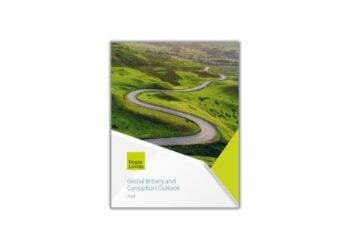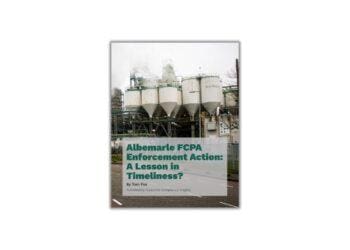In a truly extraordinary article in the New York Times (NYT), columnist Thomas L. Freidman opened the article on his interview with Crown Prince Mohammed bin Salman (MBS) with the following, “I never thought I’d live long enough to write this sentence: The most significant reform process underway anywhere in the Middle East today is in Saudi Arabia. Yes, you read that right. Though I came here at the start of Saudi winter, I found the country going through its own Arab Spring, Saudi style.” I have been reading Friedman for over 30 years and I have never seen such an opener in anything he has written. Saudi Arabia is having economic reform through anti-corruption enforcement.
From the anti-corruption perspective, there is much to cheer from the detainment of several hundred Saudi princes and others in the recent corruption crackdown which placed these men in the Riyadh Ritz-Carlton. The first is the confirmation of the cost of bribery and corruption. It is not a victimless crime that some in the US believe does not hurt anyone. MBS and his father, the King of Saudi Arabia, realized that the country could enter the 21st century with corruption sapping some 10% of the country’s annual gross national profit (GNP). MSB told Friedman, “My father saw that there is no way we can stay in the G-20 and grow with this level of corruption. In early 2015, one of his first orders to his team was to collect all the information about corruption — at the top. This team worked for two years until they collected the most accurate information, and then they came up with about 200 names.”
Equally important was the second part of this statement. This corruption crackdown was not a witch hunt but a well-thought out, considered and research investigation into corruption in Saudi Arabia, which uncovered those guilty of violating Saudi law. MBS said, “When all the data was ready, the public prosecutor, Saud al-Mojib, took action”. As “each suspected billionaire or prince was arrested and given two choices: “We show them all the files that we have and as soon as they see those about 95 percent agree to a settlement.”
The settlement entailed “signing over cash or shares of their business to the Saudi state treasury.” The amount estimated to be recovered is up to $100 billion for the Saudi treasury. But it was not just a money grab as MBS noted, “About 1 percent are able to prove they are clean and their case is dropped right there. About 4 percent say they are not corrupt and with their lawyers want to go to court. Under Saudi law, the public prosecutor is independent. We cannot interfere with his job — the king can dismiss him, but he is driving the process … We have experts making sure no businesses are bankrupted in the process” — to avoid causing unemployment.”
Yet this may only be the beginning of a new way of doing business in the Kingdom. MBS said “There is no way, he added, to root out all corruption from top to the bottom, “So you have to send a signal, and the signal going forward now is, ‘You will not escape.’ And we are already seeing the impact,” like people writing on social media, “I called my middle man and he doesn’t answer.”
Internally within the country, “The stakes are high for M.B.S. in this anticorruption drive. If the public feels that he is truly purging corruption that was sapping the system and doing so in a way that is transparent and makes clear to future Saudi and foreign investors that the rule of law will prevail, it will really instill a lot of new confidence in the system. But if the process ends up feeling arbitrary, bullying and opaque, aimed more at aggregating power for power’s sake and unchecked by any rule of law, it will end up instilling fear that will unnerve Saudi and foreign investors in ways the country can’t afford.”
The Saudi approach speaks to perhaps the greatest reason for enforcement of anti-corruption laws such as the Foreign Corrupt Practices Act (FCPA). There have been ties from corruption to terrorism based upon the creation of unequal societies and the hopelessness of those not enriched by corruption. The FCPA has allowed the US to at least make illegal this destructive conduct by US companies. As recorded by former Secretary of Defense Robert Gates in his memoirs, Duty: Memoirs of a Secretary at War, “In a private meeting, the king [former King Abdullah of Saudi Arabia] committed to a $60 billion weapons deal including the purchase of eighty-four F-15’s, the upgrade of seventy-15s already in the Saudi air force, twenty-four Apache helicopters, and seventy-two Blackhawk helicopters. His ministers and generals had pressed him hard to buy either Russian or French fighters, but I think he suspected that was because some of the money would end up in their pockets. He wanted all the Saudi money to go toward military equipment, not into Swiss bank accounts, and thus he wanted to buy from us. The king explicitly told me saw the huge purchase as an investment in a long-term strategic relationship with the United States, linking our militaries for decades to come.” [emphasis supplied]
The actions by the current King and MSB demonstrate the economic destruction wrought by bribery and corruption. Their actions to try and change the culture of the country have been well received by its citizens. Friedman reported, “Not a single Saudi I spoke to here over three days expressed anything other than effusive support for this anticorruption drive. The Saudi silent majority is clearly fed up with the injustice of so many princes and billionaires ripping off their country. While foreigners, like me, were inquiring about the legal framework for this operation, the mood among Saudis I spoke with was: “Just turn them all upside down, shake the money out of their pockets and don’t stop shaking them until it’s all out!””
There continues to be commentators who believe the US has no business in the anti-corruption enforcement business. Such a myopic view fails to grasp the invidiousness of corruption and its negative impact on the US. The Saudis are staunch allies of the US. If the US allowed or even encouraged engagement in corruption, they would be playing directly into the hands of terrorists who wish to visit ill upon the US. There has been no official comment from the current administration on the Saudi corruption crackdown. We can only hope they recognize the fight as one which is directly in the interests of America to continue to lead and participate.
This article was republished with permission from Tom Fox’s FCPA Compliance and Ethics Blog.
This publication contains general information only and is based on the experiences and research of the author. The author is not, by means of this publication, rendering business advice, legal advice or other professional advice or services. This publication is not a substitute for such legal advice or services, nor should it be used as a basis for any decision or action that may affect your business. Before making any decision or taking any action that may affect your business, you should consult a qualified legal advisor. The author, his affiliates and related entities shall not be responsible for any loss sustained by any person or entity that relies on this publication. The author gives his permission to link, post, distribute or reference this article for any lawful purpose, provided attribution is made to the author. The author can be reached at tfox@tfoxlaw.com.



 Thomas Fox has practiced law in Houston for 25 years. He is now assisting companies with FCPA compliance, risk management and international transactions.
He was most recently the General Counsel at Drilling Controls, Inc., a worldwide oilfield manufacturing and service company. He was previously Division Counsel with Halliburton Energy Services, Inc. where he supported Halliburton’s software division and its downhole division, which included the logging, directional drilling and drill bit business units.
Tom attended undergraduate school at the University of Texas, graduate school at Michigan State University and law school at the University of Michigan.
Tom writes and speaks nationally and internationally on a wide variety of topics, ranging from FCPA compliance, indemnities and other forms of risk management for a worldwide energy practice, tax issues faced by multi-national US companies, insurance coverage issues and protection of trade secrets.
Thomas Fox can be contacted via email at tfox@tfoxlaw.com or through his website
Thomas Fox has practiced law in Houston for 25 years. He is now assisting companies with FCPA compliance, risk management and international transactions.
He was most recently the General Counsel at Drilling Controls, Inc., a worldwide oilfield manufacturing and service company. He was previously Division Counsel with Halliburton Energy Services, Inc. where he supported Halliburton’s software division and its downhole division, which included the logging, directional drilling and drill bit business units.
Tom attended undergraduate school at the University of Texas, graduate school at Michigan State University and law school at the University of Michigan.
Tom writes and speaks nationally and internationally on a wide variety of topics, ranging from FCPA compliance, indemnities and other forms of risk management for a worldwide energy practice, tax issues faced by multi-national US companies, insurance coverage issues and protection of trade secrets.
Thomas Fox can be contacted via email at tfox@tfoxlaw.com or through his website 





